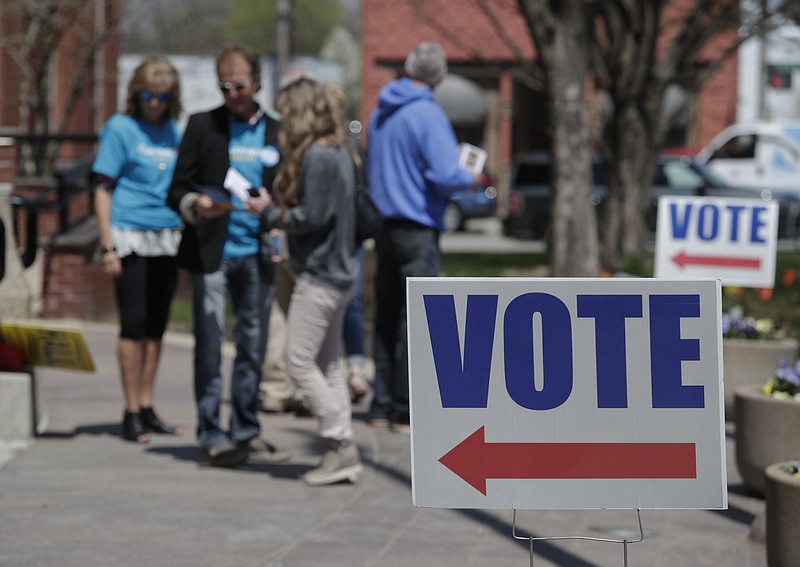The mid-term elections prognosticators are out in fine form, and the views seem shaped by the partisan bents of the messengers.
In The Hill on the morning after Tuesday primary elections in four states, a headline read, "Blue wave? Not so fast after GOP primary results."
Accordingly, Donald Trump tweeted, in part: "The Republican Party had a great night. Tremendous voter energy and excitement, and all candidates are those who have a great chance of winning in November. why wouldn't we win?"
What he meant was, Republicans dodged a bullet when November-unelectable ex-con and coal baron Don Blankenship took third place in West Virginia's U.S. Senate GOP primary race. Instead, voters chose Attorney General Patrick Morrisey (over an incumbent GOP House representative), who could give Democratic incumbent Sen. Joe Joe Manchin III a real run.
The New York Times noted that "Republicans averted a worst-case scenario" when Blankenship was not nominated.
And The Washington Post wrote: "Republicans should take note, however: Democratic turnout for [West Virginia's Democratic] uncompetitive primary exceeded turnout for the hotly contested GOP nomination [the one involving the ex-con coal baron] by more than 23,000 - continuing a pattern of high voter enthusiasm among Democrats."
It's worth pointing out that West Virginia is a state Trump won by 42 percentage points in 2016 and Mitt Romney won by almost 27 points in 2012. Now it has "high voter enthusiasm among Democrats."
Republican members of the House fared especially poorly in primaries across West Virginia, Indiana, North Carolina and Ohio - hinting at another change election and another batch of outsiders looking to shake up Washington.
In North Carolina, an incumbent House member lost to a former Baptist pastor, despite a huge spending advantage. In the primary to take on Indiana Democratic Sen. Joe Donnelly, a wealthy Republican businessman won an upset over two GOP congressmen who sought the Republican nod.
In Ohio, support for GOP Rep. Jim Renacci was surprisingly squishy in his primary bid to challenge Democratic Sen. Sherrod Brown. Renacci, despite a Trump endorsement and recorded robo call, garnered only 47 percent against four unknown candidates.
That's five GOP members who will not return to the House next year: four who lost bids to become a senator, and one who lost his re-election race..
The takeaway in The New York Times was simpler: "Congress is very unpopular. Voters nearly always dislike Congress, but Tuesday was a vivid illustration of just how toxic the taint of Washington may be in 2018. The night was a near-wipeout for members of the House seeking higher office."
Here's the disconnect: The same voters - especially Republicans - who don't like the "taint" of Washington, are the revered "base" for Donald Trump - the man who has, so far, only made the Washington he calls "a swamp" that much swampier.
Yet in Tuesday's Republican primaries, it was Trump's party, not the Republican Party, that took the wins.
"On Tuesday, not one Trump critic won a Republican primary," the Times noted. "The major Republican candidates cast themselves as Trump allies and in some cases explicitly invoked him as a role model."
Our own retiring Republican Sen. Bob Corker made a similar point to reporters and editors of the Chattanooga Times Free Press recently. Corker called it "tribal" politics over President Donald Trump, and he said it polarizes Congress to the point that it can't solve the nation's problems.
"It's Trump. You're with him or you're against him, and that's all the campaigns are about now," Corker said. "And I would guess on the Democratic side they want to know one thing: Are you doing everything you can to hurt the president?"
That brings us to the Democrats. And the women.
Here's a Politico headline: "Women trounce men on first major primary night of the year." A second, smaller headline noted: "But overwhelmingly, it was Democratic women winning nominations in GOP-leaning districts."
Of 20 open House Democratic primaries held thus far and containing at least one female candidate, voters selected a woman in 17 of them. In November, women will make up one-third of House nominees from the four states that held primaries Tuesday, a significant number considering that men accounted for more than 80 percent of all candidates running in those races. All told, there are about 400 women running for House seats - more than ever, and most of them are Democrats.
But primary success doesn't mean victory in the fall. The country wasn't ready for a female president in either 2012 or 2016. Will it be ready for more women in the House, Senate, and state offices in 2018?
Time will tell. In a year when deep-seated antipathy toward Trump is fueling Democratic enthusiasm, some of those districts that normally favor the GOP may well be in reach.
Christine Matthews, a veteran GOP pollster, told Politico: "With a Democratic wave, you may see better odds for these women than you do on paper."
Blue Wave? Yes, if we're resolute. It's early still. And in primaries, the tribal Trump GOP eats its young.
